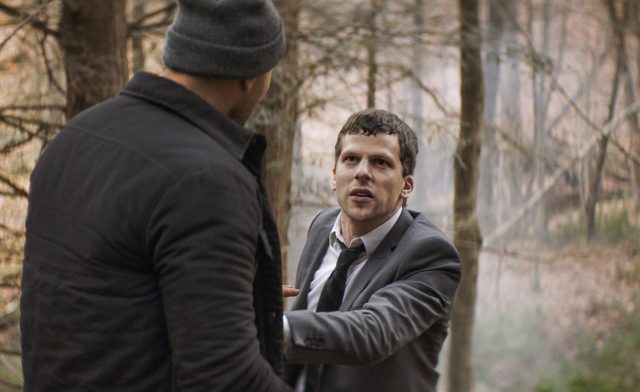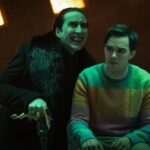The Hummingbird Project: What About the Lemon Farmers?, by Craig Schroeder

Squint just a bit and The Hummingbird Project—the new film from Kim Nguyen—looks an awful lot like David Fincher’s 2010 film The Social Network. Both films share Jesse Eisngberg as a lead, playing a confident neurotic who wades into murky ethical waters in an attempt to advance worldwide technology and accumulate obscene wealth. But whereas Fincher’s film sees its subject for what he is, a genius poisoned by ego and pride, The Hummingbird Project flirts with superficial introspection while trying to make its subject a Wall Street Robin Hood, an oxymoron if there ever was one.
The Hummingbird Project is an intensely strange film, told with such specificity that it must be based on a true story—Alexander Skarsgard, a beautiful man and the closest thing we have to a living Renaissance sculpture, even shaved his head into a George Constanza bald pattern, suggesting a real-life analog—and yet it isn’t. Eisenberg and Skarsgard play cousins, Vincent and Anton Zaleski, working for a high-frequency trading company captained by shrewd businesswoman Eva Torres (Salma Hayek). The cousins decide to branch out on their own, using complicated algorithms and high tech voodoo to run an underground fiber-optic cable across the country from Kansas to New York in an effort to get a millisecond (or the single flap of a hummingbird’s wing) advantage on high-frequency stock traders. If that sounds confusing, it is, and the film only does a halfway decent job of explaining it. However, the film finds success in some of the smaller story beats, resulting in a financial thriller that only thrills in fits and starts.
Parts of The Hummingbird Project play like an Ocean’s 11 film but instead of finding ways to crack an impenetrable safe or forge a sophisticated decoy, Vincent and Anton have to drill through miles of untrodden Appalachian terrain and navigate Amish farmers who refuse to sell even a square foot of their sacred land. Like many a heist film, Vincent and Anton assemble their crew of boots on the ground (led by Better Call Saul’s Michael Mando, who is little more than a thankless piece mover here), plan for every setback, and improvise when those plans go awry. These moments can be exciting and it’s good fun to watch Eisenberg fast-talk his way to acquiescence. But when the screenplay moves beyond these elements—including a cancer subplot that is used only as a lazy device to introduce external pressure on the characters—the film sputters and struggles to maintain focus.
Skarsgard is a craftsman and takes a character built from affectations—Anton is an awkward programmer who probably exists somewhere on the autism spectrum—and turns in a performance of intangible quality (in one scene, Anton is chased by police officers and runs with an incredibly dorky gate, a choice that allows the audience an unspoken look into how Anton physically exists in the world). Eisenberg has made a career from his effortless ability to portray un-confident confidence. He’s great at the fast-talking hustler who barely believes his own bullshit but, like a record playing at at the wrong speed, when things slow down and Vincent confronts quieter moments, he’s less convincing. And while Vincent Zaleski is a fast-talking hustler, the film’s final act asks Eisenberg to wade into overwrought waters and you can see the nuts and bolts begin to fall off as the character collapses into melodrama.
Just like The Social Network, The Hummingbird Project has an ethical elephant in the room. Vincent and Anton are aiming to play the global market, making millions while the little guy sees nothing. When a peripheral character presses for a description of his work, Anton explains—using a hypothetical involving a lemon farmer—how millions of dollars are made by investing in lemons and trading on those investments using high tech fiber optics, while the farmer who grew the lemons continues to receive pennies. What about the lemon farmer? The question is asked of Anton and he can’t provide an adequate answer. But unfortunately, neither can the movie, hoping that asking the question is good enough. And worse, rather than ask its characters to wrestle with the question, The Hummingbird Project tries to depict Anton and Vincent—whose motives are selfish and tactics predatory—as economic vigilantes, a 21st century Robin Hood and Little John. “We’d burn [Wall Street] to the ground, bring all of the lemon farmers and roast marshmallows by the fire,” Anton says late in the movie, framing their entire scheme as an altruistic endeavor. It’s a ludicrous notion that those manipulating the market will be the ones to save the world from themselves. It would be as if Jordan Belfort or Gordon Gecko looked into the camera and said “I did it all for you, the little guys!” and danced out of frame wearing a top hat and tails. The Hummingbird Project recognizes the human suffering at the other end of its story but can’t put out the fire through the smoke.
The inability to convey the cousins’ intent or genuine efforts to wrestle with the ethical implications is the problem at the core of the film. Whereas Fincher had the sense to make the thrust of The Social Network Mark Zuckerberg’s battle with his better angels, Nguyen’s script doesn’t do the necessary work, asking us to merely respect the hustle. But what about the lemon farmer? The Hummingbird Project asks the question but never gives a satisfying answer.































The Social Network wasn’t interested in the real Zuckerberg. The lead is an Aaron Sorkin character instead.
If autism is a spectrum, then wouldn’t everyone be on it somewhere?